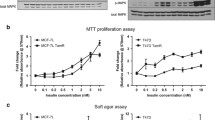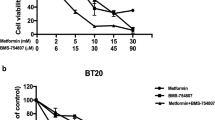Abstract
Insulin‐like growth factor (IGF)‐I protects many cell types from apoptosis. As a result, it is possible that IGF‐I‐responsive cancer cells may be resistant to apoptosis‐inducing chemotherapies. Therefore, we examined the effects of IGF‐I on paclitaxel and doxorubicin‐induced apoptosis in the IGF‐I‐responsive breast cancer cell line MCF‐7. Both drugs caused DNA laddering in a dose‐dependent fashion, and IGF‐I reduced the formation of ladders. We next examined the effects of IGF‐I and estradiol on cell survival following drug treatment in monolayer culture. IGF‐I, but not estradiol, increased survival of MCF‐7 cells in the presence of either drug. Cell cycle progression and counting of trypan‐blue stained cells showed that IGF‐I was inducing proliferation in paclitaxel‐treated but not doxorubicin‐treated cells. However, IGF‐I decreased the fraction of apoptotic cells in doxorubicin‐ but not paclitaxel‐treated cells. Recent work has shown that mitogen‐activated protein kinase (MAPK) and phosphotidylinositol‐3 (PI‐3) kinase are activated by IGF‐I in these cells. PI‐3 kinase activation has been linked to anti‐apoptotic functions while MAPK activation is associated with proliferation. We found that IGF‐I rescue of doxorubicin‐induced apoptosis required PI‐3 kinase but not MAPK function, suggesting that IGF‐I inhibited apoptosis. In contrast, IGF‐I rescue of paclitaxel‐induced apoptosis required both PI‐3 kinase and MAPK, suggesting that IGF‐I‐mediated protection was due to enhancement of proliferation. Therefore, IGF‐I attenuated the response of breast cancer cells to doxorubicin and paclitaxel by at least two mechanisms: induction of proliferation and inhibition of apoptosis. Thus, inhibition of IGF‐I action could be a useful adjuvant to cytotoxic chemotherapy in breast cancer.
Similar content being viewed by others
References
Kleinberg DL: Role of IGF-I in normal mammary development. Breast Cancer Res Treat 47: 201–208, 1998
Werner H, Le Roith D: The insulin-like growth factor-I receptor signaling pathways are important for tumorigenesis and inhibition of apoptosis. Crit Rev Oncol 8: 71–92, 1997
Baserga R, Hongo A, Rubini M, Prisco M, Valentinis B: The IGF-I receptor in cell growth, transformation and apoptosis. Biochim Biophys Acta 1332: F105–F126, 1997
Resnicoff M, Baserga R: The role of insulin-like growth factor I receptor in transformation and apoptosis. Ann New York Acad Sci 842: 76–81, 1998
Yee D, Jackson JG, Weng C-N, Gooch JL, Lee AV: The IGF system in breast cancer. In: Takano K, Hizuka N, Takahashi, S-I (eds), Molecular Mechanisms to Regulate the Activities of Insulin-like Growth Factors, Elsevier, 1998, pp 319–325
Cullen KJ, Yee D, Sly WS, Perdue J, Hampton B, Lippman ME, Rosen N: Insulin-like growth factor receptor expression and function in human breast cancer. Cancer Res 50: 48–53, 1990
Sell C, Baserga R, Rubin R: Insulin-like growth factor I (IGFI) and the IGF-I receptor prevent etoposide-induced apoptosis. Cancer Res 55: 303–306, 1995
Lamm GM, Christofori G: Impairment of survival factor function potentiates chemotherapy-induced apoptosis in tumor cells. Cancer Res 58: 801–807, 1998
Liu Y, Lehar S, Corvi C, Payne G, O'Connor R: Expression of the insulin-like growth factor I receptor C terminus as a myristylated protein leads to induction of apoptosis in tumor cells. Cancer Res 58: 570–576, 1998
O'Connor R, Kauffman-Zeh A, Liu Y, Lehar S, Evans GI, Baserga R, Blattler WA: Identification of domains of the IGFIR that are required for protection from apoptosis. Mol Cell Biol 17, 1997
Guo YS, Houston CW, Thompson JC, Townsend CMJ: Insulin-like growth factor-I promotes multidrug resistance in MCLM colon cancer cells. Cell Physiol 175: 141–148, 1998
Geier A, Beery R, Haimsohn M, Karasik A: Insulin-like growth factor-1 inhibits cell death induced by anticancer drugs in the MCF-7 cells: involvement of growth factors in drug resistance. Cancer Invest 13: 480–486, 1995
Rasbridge SA, Gillett CE, Seymour AM, Patel K, Richards MA, Rubens RD, Millis RR: The effects of chemotherapy on morphology, cellular proliferation, apoptosis and oncoprotein expression in primary breast carcinoma. Br J Cancer 70: 335–341, 1994
Saunders D, Lawrence W, Christensen C, Wappler N, Raun H, Deppe G: Paclitaxel-induced apoptosis in MCF-7 breast cancer cells. Int J Cancer 70: 214–220, 1997
Torres K, Horwitz SB: Mechanisms of taxol-induced cell death are concentration dependent. Cancer Res 58: 3620–3626, 1998
Dufourny B, Alblas J, van Teeffelen HAAM, van Schaik FMA, van der Burgi B, Steenbergh PH, Sussenbach JS: Mitogenic signaling of insulin-like growth factor I in MCF-7 human breast cancer cells requires phosphatidylinositol 3-kinase and is independent of mitogen-activated protein kinase. J Biol Chem 272: 31163–31171, 1997
Jackson JG, White MB, Yee D: Insulin receptor-substrate-1 (IRS-1) is the predominant signaling molecule activated by insulin-like growth factor-I (IGF-I), insulin, and interleukin-4 (IL-4) in estrogen receptor positive human breast cancer cells. J Biol Chem 273: 9994–10003, 1998
Minshall C, Arkins S, Freund GG, Kelley KW: Requirement for phosphatidylinositol 3-kinase to protect hemopoietic progenitors against apoptosis depends upon the extracellular survival factor. J Immunol: 939–947, 1996
Kulik G, Klippel A, Weber MJ: Antiapoptotic signalling by the insulin-like growth factor I receptor, phosphatidylinositol 3-kinase, and Akt. Mol Cell Bol 17: 1595–1606, 1997
Franke TF, Yang S-I, Chan TO, Datta K, Kazauskas A, Morrison DK, Kaplan DR, Tsichlis PN: The protein kinase encoded by the Akt proto-oncogene is a target of the PDGF activated phosphatidylinositol 3-kinase. Cell 81: 727–736, 1995
Datta SR, Didek H, Tao X, Masters S, Fu H, Gotoh Y, Greenberg ME: Akt phosphorylation of BAD couples survival signals to the cell-intrinsic death machinery. Cell 91: 231–241, 1997
Zha J, Harada H, Yang E, Jockel J, Korsmeyer SJ: Serine phosphorylation of death agonist BAD in response to survival factor results in binding to 14-3-3 not BCL-Xl. Cell 87: 619–628, 1996
Twentyman PR, Luscombe M: A study of some variables in a tetrazolium dye (MTT) based assay for cell growth and chemosensitivity. Br J Cancer 56: 279–285, 1987
Schiff PB, Horwitz SB: Taxol stabilizes microtubules in mouse fibroblast cells. PNAS 77, 1980
Tewey KM, Rowe TC, Tand L, Halligan BD, Liu LF: Adriamycin-induced DNA damage mediated by mammalian DNA topoisomerase II. Science 226, 1984
Dunn SW, Ehrlich M, Sharp NJH, Reiss K, Solomon G, Hawkins R, Baserga R, Barrett JC: A dominant negative mutant of the insulin-like growth factor-I receptor inhibits the adhesion, invasion, and metastasis of breast cancer. Cancer Res 58: 3353–3361, 1998
Yu R, Shtil AA, Tan T-H, Roninson IB, Kong A-NT: Adriamycin activates c-jun N-terminal kinase in human leukemia cells: a relevance to apoptosis. Cancer Lett 107: 73–81, 1996
Wang T-H, Wang H-S, Ichijo H, Giannakakou P, Foster JS, Fojo T, Wimalasena J: Microtubule-interfering agents activate c-Jun N-terminal kinase/stress-activated protein kinase through both ras and apoptosis signal-regulating kinase pathways. J Biol Chem 273: 4928–4936, 1998
Manfredi JJ, Parness J, Horwitz SB: Taxol binds to cellular microtubules. J Cell Biol 94, 1982
Horwitz SB, Lothstein L, Manfredi JJ, Mellado W, Parness J, Roy SN, Schiff PB, Sorbara L, Zeheb R: Taxol: mechanisms of action and resistance. Ann New York Acad Sci 466: 733–744, 1986
Lee A, Weng C, Jackson J, Yee D: Activation of estrogen receptor-mediated gene transcription by IGF-I in human breast cancer cells. J Endo 152: 39–47, 1997
Author information
Authors and Affiliations
Rights and permissions
About this article
Cite this article
Gooch, J.L., Van Den Berg, C.L. & Yee, D. Insulin‐like growth factor (IGF)‐I rescues breast cancer cells from chemotherapy‐induced cell death – proliferative and anti‐apoptotic effects. Breast Cancer Res Treat 56, 1–10 (1999). https://doi.org/10.1023/A:1006208721167
Issue Date:
DOI: https://doi.org/10.1023/A:1006208721167




